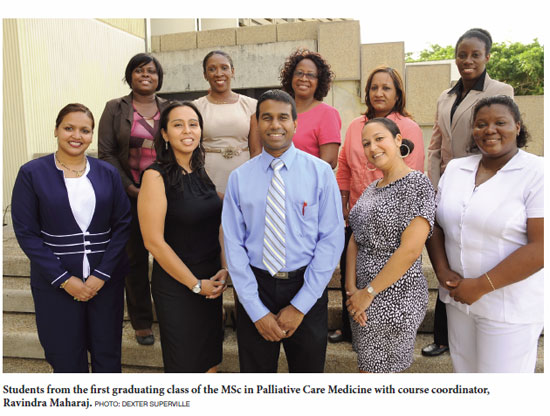
Palliative care is a relatively new area in medicine. It involves supporting the seriously ill and those who are terminally ill and close to the end of life. As this specialty is still gaining ground, the public may not be familiar with the services it can provide.
Palliative care is frequently confused with hospice care, which focuses more on end of life care. It should be noted that while hospice care follows the same philosophy, palliative care can be involved from the point of diagnosis of a serious or life-threatening illness.
Essentially, to palliate is to make something, such as the systems of a disease, less severe without removing the cause. This can involve a variety of approaches because managing serious illness or even the dying process is complex. Support may be required in the physical, psychological, functional and spiritual domains, and this is ideally provided by a team.
This team approach frequently includes nurses, pharmacists, chaplains, social workers, physical therapists and physicians to provide comprehensive care plans. It goes beyond the traditional scenario, where a doctor may recommend a series of medications and treatments without addressing these other needs of the patient and family.
 Communication is a vital component of palliative care. Frequently, medical treatment plans can be difficult for many to understand. Palliative care teams ensure that the medical team, patients and families are on the same page. Quite often, emotions may run high and it takes a great deal of training to manage the situation in a sensitive but practical way. Communication is a vital component of palliative care. Frequently, medical treatment plans can be difficult for many to understand. Palliative care teams ensure that the medical team, patients and families are on the same page. Quite often, emotions may run high and it takes a great deal of training to manage the situation in a sensitive but practical way.
Studies have shown that the majority of people who are near the end of their lives experience distressing symptoms, including pain and shortness of breath. Palliative care teams provide plans and support to mitigate these stressors so that the quality of life is kept in focus even if expectations of time remaining are short.
With anincreasingly aging population, it is expected that the demand for health care practitioners familiar with caring for the elderly and more vulnerable will rise.
Prior to 2012, education in palliative care was limited to a few lectures in the undergraduate medical programme at the Faculty of Medical Sciences. There were two charity-driven hospice centres and a few physicians in the community who comforted the dying, but there was no formalized service in the public setting. Through the efforts of The UWI and the Palliative Care Society of Trinidad and Tobago, a Master’s degree programme was set up to train a variety of health care practitioners to improve the knowledge base and skillset locally.
Students were taught skills in communication, planning, symptom recognition and management which were complemented by lecturers from a palliative care background,as well as speakers from other fields, including leaders in nursing, social work, religion and medicine.
We congratulate the graduating class of the MSc in Palliative Care Medicine. This inaugural class has completed the two-year part-time programme where they learned about the principles of palliative care. The class had a diverse background made up of health professionals, including nurses, a radiotherapist, social workers and doctors.
The class started in September 2012 with the assistance of the late Professor Larry Librach, Canadian pioneer of palliative care and his team from the TemmyLatnerCentre of Palliative Care. I joined the programme as a lecturer in the first semester, keen to take up the baton from the Canadians to be a point of reference for these students.
Twelve students graduated in 2014, with two achieving distinctions. Three students produced research projects highlighting the burden of palliative care in Trinidad and nine had clinical exposure to palliative care delivery at homes, clinics, tertiary centres and hospices. There is now a Palliative Care clinic at the National Radiotherapy Centre in St. James as well as plans for a public service in-patient hospice facility.
Ravindra Maharaj is course coordinator for the MSc in Palliative Care Medicine. He is a UWI graduate who returned to Trinidad as an American Board-Certified Internist, Geriatrician and Palliative Care physician. The UWI is reviewing applications for a new class to begin in September 2014. Interested candidates can contact the School for Graduate Studies and Research on the first floor of the Lloyd Braithwaite Student Administration Building, or E-mail: postgrad@sta.uwi.edu or visit the website at http://sta.uwi.edu/postgrad/ |





